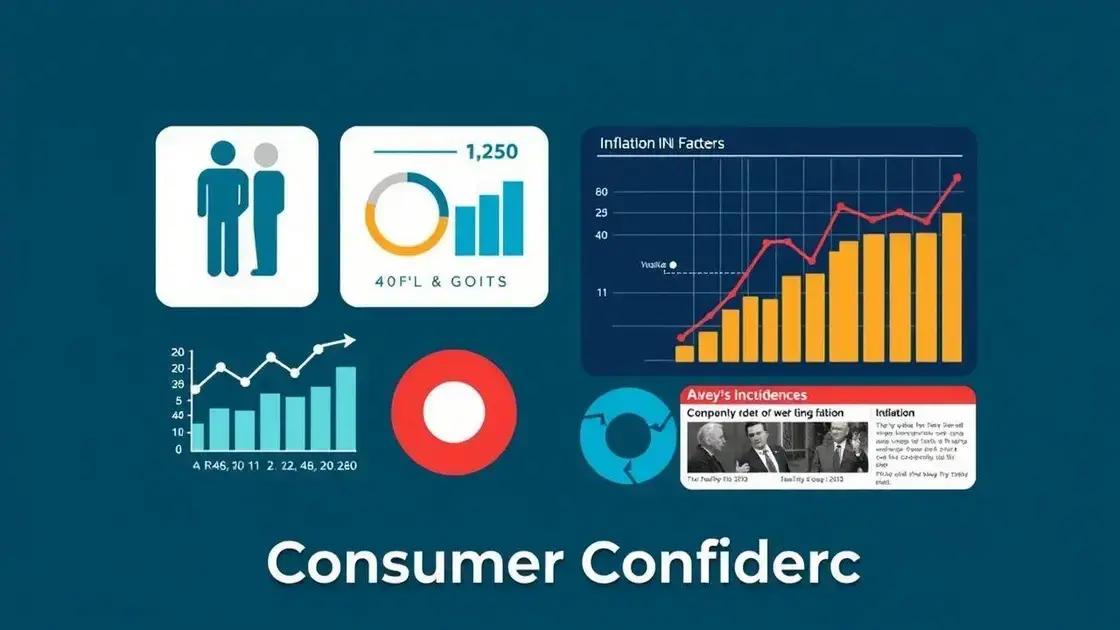Consumer confidence index: understanding its impact

Anúncios
The consumer confidence index (CCI) measures the optimism or pessimism of consumers regarding their financial situation and the economy, influencing spending behaviors and economic growth.
The consumer confidence index plays a crucial role in understanding economic health. It reflects how optimistic consumers feel about their financial situations, influencing spending decisions. Have you ever wondered how this index affects your daily life?
Anúncios
What is the consumer confidence index?
The consumer confidence index (CCI) is a vital economic indicator. It measures how optimistic or pessimistic consumers are about their expected financial situation. This index provides insight into consumer behavior, helping economists predict spending trends.
The CCI is calculated based on surveys that ask consumers about their current and future economic expectations. Understanding how the CCI works is essential for both businesses and policymakers. A high CCI suggests that people are confident in the economy and are likely to spend more, stimulating economic growth.
Anúncios
Components of the Consumer Confidence Index
There are several key components that contribute to the consumer confidence index. These include:
- Current financial situation
- Future economic outlook
- Employment prospects
- Impact of inflation on spending
Each of these components is crucial in shaping the final score of the CCI. When these factors indicate a positive outlook, the index rises. Conversely, negative perceptions can lead to a decline.
The Importance of CCI
The consumer confidence index plays an essential role in economic forecasting. It helps businesses make informed decisions regarding production and marketing strategies. Additionally, it guides government policies on economic intervention. For instance, if the CCI drops significantly, it may signal the need for stimulus measures to encourage consumer spending.
Furthermore, a stable CCI promotes consumer spending, which is a significant driver of economic activity. When consumers feel confident about their finances, they are more likely to make large purchases, which can boost the economy.
In summary, the consumer confidence index is a critical barometer of economic health. By understanding its components and importance, consumers and businesses can better navigate economic fluctuations.
How is the consumer confidence index calculated?
The calculation of the consumer confidence index (CCI) involves a systematic approach to gathering and analyzing consumer opinions. This crucial index is derived from surveys conducted by various organizations, primarily focusing on consumer sentiments regarding their financial situation.
To begin with, organizations gather responses from a representative sample of the population. This sampling ensures that varying demographic and economic backgrounds are considered. The main goal is to get a clear picture of consumer expectations and their willingness to spend.
Key Components of the CCI Calculation
There are several essential elements in the calculation of the consumer confidence index. These factors include:
- Current economic conditions
- Future expectations for the economy
- Job market conditions
- Inflation expectations
Respondents answer questions about their perceptions of these areas, leading to valuable data that is crucial for policymakers and businesses alike.
Adjustments and Weights in CCI
Once the survey data is collected, it is adjusted to account for factors such as seasonal trends and changes in the economic environment. This adjustment helps in providing a more accurate snapshot of consumer confidence.
Each component of the survey is weighted differently based on its importance. For example, questions about current economic conditions might have a more significant impact on the index than those regarding future expectations. Understanding these weights is essential for interpreting the consumer confidence index correctly.
Overall, the calculation of the consumer confidence index relies heavily on real consumer experiences and expectations. By combining various data points, economists can determine how consumer confidence aligns with actual economic performance.
Factors influencing the consumer confidence index

Various factors influence the consumer confidence index (CCI), reflecting the overall mood of consumers regarding their financial stability and the economy. Understanding these factors can help predict shifts in economic behavior.
One major factor is the current state of the economy. When the economy is doing well, consumers typically feel more secure about their jobs and future income. This sense of security prompts increased spending, which is vital for economic growth.
Key Influencing Factors
Several key elements impact the consumer confidence index:
- Employment Rates: Higher employment means more income, boosting consumer confidence.
- Inflation: Rising prices can negatively affect how consumers feel about their financial situation.
- Economic News: Positive or negative news reported in the media can greatly shape consumer perceptions.
- Government Policies: Tax changes, stimulus measures, and regulations can influence consumer confidence.
Additionally, consumers’ personal financial situations play a crucial role. If individuals feel their financial health is stable, they are more likely to spend money, contributing to a positive CCI. On the other hand, concerns about job security or unexpected expenses can lead to a decrease in consumer confidence.
Consumer expectations about the future also play a significant role. If people are optimistic about future economic growth, they tend to spend more now, anticipating greater income ahead. This cycle of confidence and spending drives the economy forward.
In summary, understanding the factors that influence the consumer confidence index can help businesses and policymakers navigate economic challenges more effectively. By analyzing these variables, one can better predict consumer behavior and make informed decisions.
The relationship between consumer confidence and spending
The relationship between consumer confidence and spending is critical in understanding economic health. When consumers feel confident about their financial future, they are more likely to spend money. This spending fuels growth and stimulates the economy.
Individuals tend to make larger purchases when they feel secure in their jobs and financial situation. Confidence encourages people to invest in goods and services, which leads to a positive cycle of economic expansion.
How Confidence Affects Spending
Several factors show how consumer confidence influences spending behaviors:
- Increased Expenditure: Confident consumers are more willing to spend on big-ticket items like cars and homes.
- Daily Purchases: A sense of assurance leads to more spending on everyday necessities and luxury items.
- Investment in Experiences: People often feel encouraged to spend on vacations, dining, and entertainment when they feel secure.
- Future Expectations: If consumers anticipate good economic conditions, they may spend more now, believing their financial situation will remain stable.
Conversely, low consumer confidence can lead to decreased spending. When people feel uncertain about their financial future, they tend to save more and spend less. This behavior can negatively impact businesses and the overall economy.
When government policies and economic conditions contribute to rising consumer confidence, spending tends to increase. For instance, tax cuts or stimulus checks can boost consumer spending quickly, showing the interconnectedness of these factors.
Ultimately, the relationship between consumer confidence and spending is a vital element in economic analysis. Understanding this connection helps businesses and policymakers make informed decisions to promote growth.
Interpreting changes in the consumer confidence index
Interpreting changes in the consumer confidence index (CCI) is vital for understanding economic trends. When the CCI fluctuates, it can indicate shifts in consumer sentiment and potential changes in spending behavior.
Generally, a rising CCI suggests increased consumer confidence. This typically means people are feeling secure about their financial futures. Factors such as job stability and positive economic news can contribute to this rise. Conversely, when the CCI falls, it may signal uncertainty or concern among consumers regarding their financial situation.
Understanding CCI Movements
When analyzing changes in the consumer confidence index, several key aspects should be considered:
- Current Economic Conditions: Look at what is happening in the economy at the time of the change.
- Media Coverage: Pay attention to how news outlets portray economic conditions. Negative reports can lower confidence.
- Inflation Rates: Rising prices can create concerns, leading to a decrease in consumer confidence.
- Government Policies: Changes in tax laws or social services can also impact consumer feelings.
It’s important to view the CCI in context. A slight drop may not be concerning if viewed against a backdrop of overall economic growth. However, a significant decrease may prompt businesses and policymakers to take action.
Furthermore, comparing the CCI to historical data provides valuable insights. For example, if consumer confidence is significantly lower than historical averages, it may indicate potential economic challenges ahead.
To better interpret CCI changes, tracking surveys that ask specific questions about consumers’ job security and spending plans can offer additional clarity. Understanding these sentiments can provide a more rounded view of economic health.
FAQ – Frequently Asked Questions about Consumer Confidence Index
What is the consumer confidence index (CCI)?
The consumer confidence index (CCI) measures how optimistic or pessimistic consumers feel about their financial situation and the overall economy.
How does consumer confidence affect spending?
When consumer confidence is high, individuals tend to spend more money, positively impacting economic growth and business performance.
What are the main factors that influence the CCI?
Key factors include current economic conditions, employment rates, inflation, media coverage, and government policies.
Why is it important to monitor changes in the CCI?
Monitoring changes in the CCI helps businesses and policymakers understand consumer behavior, predict economic trends, and make informed decisions.






